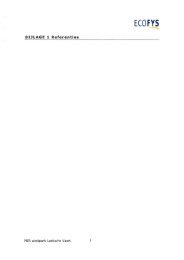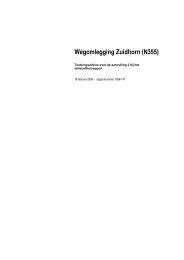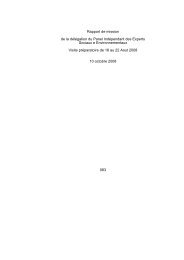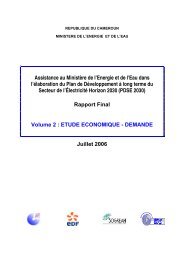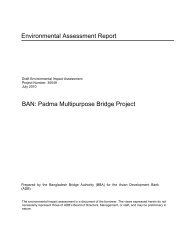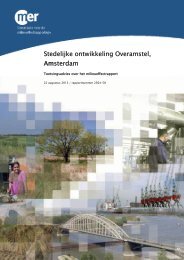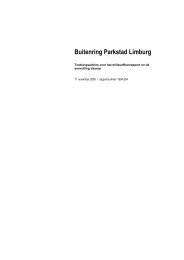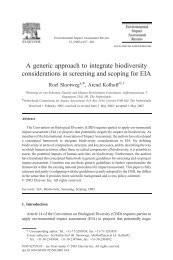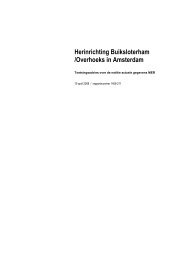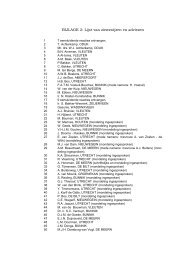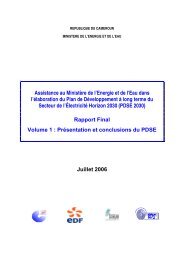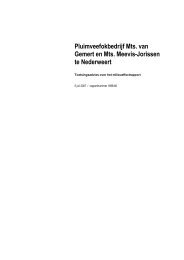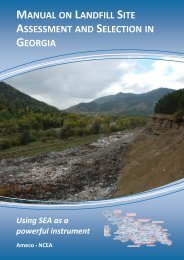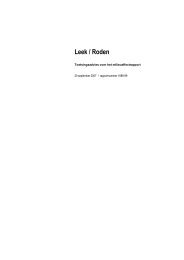Scoping Advice for the Dutch IWRM Support Programme Rwanda
Scoping Advice for the Dutch IWRM Support Programme Rwanda
Scoping Advice for the Dutch IWRM Support Programme Rwanda
You also want an ePaper? Increase the reach of your titles
YUMPU automatically turns print PDFs into web optimized ePapers that Google loves.
3. Master plan phase : 5 months. This will include workshops with relevant stakeholders topresent and discuss <strong>the</strong> draft MPNote: <strong>the</strong> exact planning <strong>for</strong> <strong>the</strong>se last two phases remains a bit unclear. The inception report<strong>for</strong>esees “Exploratory reports workshops” by <strong>the</strong> end of March and end of April 2013, and “MasterPlan workshops” in June, September, October 2013. The RWRD also speaks of a validation processstarting in June 2013 (personal comment Head of RWRD). However, according to <strong>the</strong> consultants’inception report, <strong>the</strong> actual Master Plan will only become available in August and September 2013.This seems contradictory and needs to be clarified (see also SEA task 1 on <strong>the</strong> next page).ToR <strong>for</strong> an SEA on <strong>the</strong> Master PlanTo address some of <strong>the</strong> risks associated to <strong>the</strong> Master Plan an SEA is recommended as a tool toprovide independent in<strong>for</strong>mation to <strong>the</strong> validation and decision making process. In closecollaboration with RWRD and earliest as possible, an SEA <strong>for</strong> <strong>the</strong> Master Plan should be startedaddressing <strong>the</strong> potential consequences of choices made by <strong>the</strong> Master Plan. Focus of <strong>the</strong> SEAshould be on:- contents: quality of <strong>the</strong> in<strong>for</strong>mation base, gaps in in<strong>for</strong>mation and consequences <strong>for</strong> decisionmaking; are social and environmental sustainability addressed in an appropriate manner?- governance, i.e. <strong>the</strong> appropriateness of <strong>the</strong> institutional arrangement. in particular in relationto <strong>the</strong> required flexibility <strong>for</strong> planning at catchment level, effective linkages between <strong>the</strong> MISand planning at catchment level, representation of different sectors and levels of governmentand o<strong>the</strong>r stakeholders to ensure buy-in in <strong>IWRM</strong> processes.1. Planning & process managementAs observed above, questions remain regarding <strong>the</strong> exact timing and steps in <strong>the</strong> process ofdeveloping <strong>the</strong> Master Plan. If an inclusive process (allowing all relevant stakeholders to learn of,appreciate and share insights on <strong>the</strong> Master Plan) is not secured during <strong>the</strong> Master Plandevelopment process, risk may be that stakeholders will not understand, support and ultimately,take responsibility <strong>for</strong> elements of <strong>IWRM</strong> implementation, as laid out in <strong>the</strong> Master Plan. Thiswould render <strong>IWRM</strong> unsustainable in <strong>the</strong> longer run. In addition, <strong>the</strong> SEA itself will be less effectiveif it is not well integrated into <strong>the</strong> planning process of <strong>the</strong> Master Plan. It is <strong>the</strong>re<strong>for</strong>e important <strong>for</strong>both <strong>the</strong> SEA and <strong>the</strong> Master Plan planning process, to get clarity on <strong>the</strong> exact planning of <strong>the</strong>process.SEA task 1:a. Clarify <strong>the</strong> exact phasing of <strong>the</strong> Master Plan development process, in terms ofplanning of all steps, participating stakeholders, and objective of <strong>the</strong> steps;b. Assess <strong>the</strong> feasibility of two options <strong>for</strong> <strong>the</strong> SEA time frame:a. Ideally start pro-actively with <strong>the</strong> SEA, as soon as possible in 2013, allowingto in<strong>for</strong>m <strong>the</strong> Master Plan development process on development constraintsand opportunities;b. Alternatively, do <strong>the</strong> SEA reactively, to assess <strong>the</strong> social and environmentalconsequences of <strong>the</strong> draft Management Plan as presented <strong>for</strong> validation. Thiswould bring <strong>the</strong> scope of <strong>the</strong> SEA on <strong>the</strong> validation phase;34



